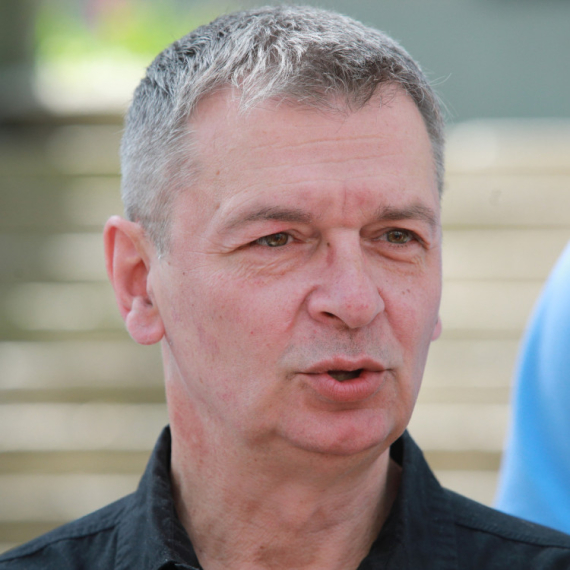Parliament fulfilled 95 percent of obligations, speaker says
Serbian parliament Speaker Slavica Đukić-Dejanović says that parliament has adopted 155 out of 164 proposed bills in the period between 2008 and December 2010.
Saturday, 28.05.2011.
18:23

Serbian parliament Speaker Slavica Djukic-Dejanovic says that parliament has adopted 155 out of 164 proposed bills in the period between 2008 and December 2010. She pointed out that parliament had thus fulfilled 95 percent of its obligations from Serbia's national plan for EU integration. Parliament fulfilled 95 percent of obligations, speaker says At a panel discussion of the European Movement International (EMI) Members Council, held in a country not an EU member for the first time since the movement was established, the Serbian parliament speaker pointed out that the Serbian parliament had amended certain provisions in the law on the election of deputies and had regulated its relationship with independent bodies in accordance with recommendations from the previous report to the European Commission (EC). Principal Advisor at the EC Directorate General for Enlargement Andris Kesteris said that the accession of Serbia to the EU, despite the enlargement fatigue in some European countries, was an irreversible process and that the only remaining question was whether it would be completed in six or ten years. Kesteris stressed he saw no particular reasons why Serbia should remain outside the EU. “The European policy towards the Western Balkans should be implemented consistently despite the enlargement fatigue in some European countries,” he said, recalling that EC President Jose Manuel Barroso had announced 2011 was a year of opportunities for the enlargement process. EMI President Pat Cox said that the enlargement fatigue was present in many EU countries, adding, however, that the concern regarding the extent to which European citizens would be able to control the process was no reason to stop the expansion, but rather called for initiating communication with citizens. “The integration of the Western Balkans is not an insurmountable challenge such as the situation the EU has with a great country like Turkey,” Cox argued, adding that no time limit for EU expansion had yet been set. “When I look at the map of the European Union I see only the Western Balkans missing, the two front teeth are not there, and if we want to have a nice smile, the region should by acceded,” he pointed out, adding that Serbia's EU accession process would be a complex one, but that that was only the beginning of the country's return to the home where it belonged together with other European countries. The meeting in Belgrade of the EMI Members Council and the panel discussion on the enlargement process, dubbed “Enlargement - Work in Progress”, gathered over 70 representatives of the European movement, including experts and representatives of the civil society, and about 50 representatives of the Serbian parliament and the country's civil society experts. Slavica Djukic-Dejanovic (Tanjug)
Parliament fulfilled 95 percent of obligations, speaker says
At a panel discussion of the European Movement International (EMI) Members Council, held in a country not an EU member for the first time since the movement was established, the Serbian parliament speaker pointed out that the Serbian parliament had amended certain provisions in the law on the election of deputies and had regulated its relationship with independent bodies in accordance with recommendations from the previous report to the European Commission (EC).Principal Advisor at the EC Directorate General for Enlargement Andris Kesteris said that the accession of Serbia to the EU, despite the enlargement fatigue in some European countries, was an irreversible process and that the only remaining question was whether it would be completed in six or ten years.
Kesteris stressed he saw no particular reasons why Serbia should remain outside the EU.
“The European policy towards the Western Balkans should be implemented consistently despite the enlargement fatigue in some European countries,” he said, recalling that EC President Jose Manuel Barroso had announced 2011 was a year of opportunities for the enlargement process.
EMI President Pat Cox said that the enlargement fatigue was present in many EU countries, adding, however, that the concern regarding the extent to which European citizens would be able to control the process was no reason to stop the expansion, but rather called for initiating communication with citizens.
“The integration of the Western Balkans is not an insurmountable challenge such as the situation the EU has with a great country like Turkey,” Cox argued, adding that no time limit for EU expansion had yet been set.
“When I look at the map of the European Union I see only the Western Balkans missing, the two front teeth are not there, and if we want to have a nice smile, the region should by acceded,” he pointed out, adding that Serbia's EU accession process would be a complex one, but that that was only the beginning of the country's return to the home where it belonged together with other European countries.
The meeting in Belgrade of the EMI Members Council and the panel discussion on the enlargement process, dubbed “Enlargement - Work in Progress”, gathered over 70 representatives of the European movement, including experts and representatives of the civil society, and about 50 representatives of the Serbian parliament and the country's civil society experts.
















Komentari 0